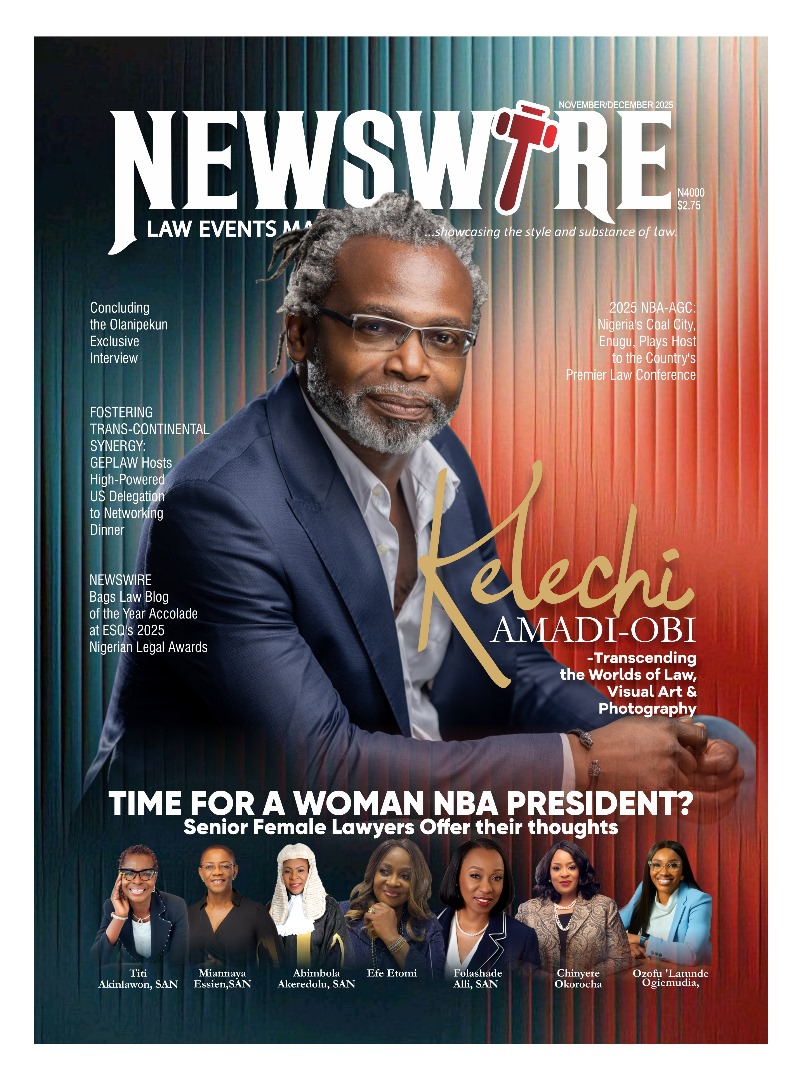The notion that discrimination and bias – however innocuous – can exist in the bastion of justice, of all places, may seem at first to be an absurd one. But as the discussants at the opening plenary session of the 2nd Annual Conference of the Nigerian Bar Association’s Women Forum (NBAWF) pointed out, it exists all the same. The panel, which discussed the theme ‘Hidden Biases in Courtroom Dynamics: Gender and the Judiciary,’ with Ireti Bakare-Yusuf, a broadcaster, activist and the Founder of the Purple Women’s Foundation as moderator, comprised a Judge on the High Court of Delta State, Hon. Justice Roli Harriman; Dorothy Udeme Ufot, SAN, Founding and Managing Partner at the law firm of Dorothy Ufot & Co.; NBA general secretary Joyce Oduah; former President of the Civil Liberties Organisation, Ayo Obe, who is a Partner at the law firm of Ogunsola Shonibare LP; and Rashidat Mohammed, Principal Partner at Rashidat Mohammed & Co.
Justice Harriman, in her opener, was quick to dispel the notion that every single female is, or has been, the victim of gender-based bias or harassment. Even as she acknowledged its existence, she said, she had never had any personal experience of it, a situation she attributed to a combination of good fortune, an uncompromising passion for excellence, and a fierce determination to succeed. This combination of qualities, Justice Harriman asserted, are the weapons the female professional needs to combat any incidence of bias.
The jurist’s views were echoed by Mrs. Ufot, SAN, who said you can only be affected by bias if you accept it. She recounted her journey toward attaining the coveted SAN rank – against seemingly impossible odds – as an example of what sheer grit and focus can do, bias or no bias. She reminded her colleagues, especially those in the litigation branch of law practice, that the courtroom is a battleground, and you cannot go into battle without a deliberate strategy and adequate preparation. You must anticipate this gender-based bias even before you encounter it, so that you’re not taken unaware.
In her contribution, Mrs. Oduah listed a number of biases women face, especially in cases of assault, rape and other forms of violence against women, especially when they are reported and brought to court. To counter these biases, she said, there is the need to re-train our Judges, as well as to celebrate narratives that challenge these prevailing biases in the public domain.
On the question of whether the reference to female Judges and Justices by masculine terms such as ‘My lord, ‘My brother Judge,’ and the oft-repeated assertion that ‘there are no ladies at the Bar,’ etc. perpetuates an anachronistic culture of patriarchy in the judiciary, Mrs. Obe was of the view that it doesn’t, nor does it diminish the ladies involved, or womanhood in general, in the least. On the contrary, she said, these designations serve to de-personalize both the person and the practice of adjudication in line with the notion of Justice as blind, impersonal, and without gender. She therefore saw no reason to change those designations for the sake of recognizing the feminine-ness of Their Lordships.
If the three previous speakers – Harriman, Ufot and Obe – had sought to downplay the incidence and/or impact of gender-based bias and discrimination on their victims, the next panelist – and the youngest among them, Rashidat Mohammed – did the very opposite; she highlighted it as forcefully as she could. Coming from a conservative Muslim background in the northern part of Nigeria, she knew first-hand what gender bias and other barriers were about, but added that she, for one, began surmounting those barriers and biases from an early age. From the preference for boys over girls among families in her culture, to the notion that Western-style education was wasted on girls, to the prevalence of child marriages, she said she resisted the pressure to conform (not just as a girl desirous of education, but in later life as an Associate in a law firm, and now as the proprietor of her own firm) – and often at great personal cost. One of the ways to overcome gender bias, she concluded, was to make the courtroom more gender-friendly – by creating crèches in courtroom premises, for example, for the use of nursing mothers such as she was back in the day.
In her summation, the Moderator, Bakare-Yusuf echoed the earlier views of NBAWF President Bamgbose, SAN that the weapons to be deployed against covert or overt bias ought to be sophisticated and multidimensional in nature, and also those of Justice Harriman and Mrs. Ufot, SAN, that a woman’s commitment to excellence, and her focus and determination, are the best antidote to gender bias.
The second session of the opening day, which considered the topic, ‘Rising to the Occasion: Leadership from the Eyes of a Contemporary Woman,’ was moderated by Shola Sholeye, the Judiciary Correspondent at Channels Television. Her panel comprised of Wola Joseph, Chief Legal Officer and Company Secretary at Eko Electricity Distribution Company; Nta Ekpiken, Principal Partner at NECS; Chinwe Odigboegwu, Legal Director at Guinness Nigeria Plc.; and the lone virtual participant, Sheryl Galler, Chairperson of the New York State Bar Association’s Women in Law Section (who spoke from her New York, USA base). Again, the imperative of constant self-improvement as a counter to negative gender stereotypes – as canvassed by Wola Joseph – was the prevailing view among the panelists at this session. As Galler also pointed out, the notion of female leadership, especially in professions that were hitherto a male preserve, is a novel one even in her part of the world. But sustained advocacy, legislation and affirmative action are making it less novel by the day. Both Ekpiken and Odigboegwu spoke on the numerous roles the modern woman is juggling – between her career (often in a leadership or senior management role), house work, including child care, and so forth – and the toll this is taking on her mental health. They proffered a number of solutions to help strike a balance between those roles in a manner that benefits the family, the organisation she works with, and the society in general.
The next panel discourse was on a contentious matter that has dominated the news in recent weeks, namely, the rejection by the Nigerian House of Representatives of a bill advocating gender equality in Nigeria, and the national outcry that followed that rejection. The session that gathered to discuss the topic ‘Advancing Society: The National Assembly as a Friend or Foe?’ was moderated by Mrs. Folashade Olusanya, Partner at the law firm of Jackson, Etti & Edu. It comprised of Hon. Onofiok Luke, Chairman of the House Judiciary Committee; Kunle Lawal, Executive Director at Electoral College Nigeria; and Mahmud Yusuf, Programme Manager at the Network of Universities Legal Aid Institutions (NULAI Nigeria). The ladies on the panel were Dr. Foluke Dada, Founding Partner at District Law Firm in Lagos; and the lone virtual participant, Prof. Uche Ewelukwa Offodile, whose spoke from Boston, Mass., USA, where she is a Senior Fellow at Harvard University’s Kennedy School of Government.
It will be recalled that on March 1, 2022, the overwhelmingly male-dominated National Assembly voted down a bill seeking to enshrine greater participation in the nation’s public life by women, as well as the expansion of their rights in matters of leadership, governance, citizenship of Nigeria, and indigene-ship of states (especially by marriage). Critical stakeholders and observers across the country and beyond saw the NASS’s action as a major setback and a blow to the country’s march towards nationhood and even to her developmental aspirations.
What went wrong? What was behind the legislators’ action? Why was there so little resistance to it in-House? And how can we walk back that decision, undo the damage, and reclaim our high moral ground as a people? Those were the issues the session came to consider. As a member of that House (and of that overwhelming male majority of over 95%), Hon. Luke was clearly in the firing line. Far from seeking to defend the actions of his colleagues, however, he advocated greater participation by the womenfolk in the critical decision-making process in the country – a situation he said was far from being the case at present. He saluted his female colleagues for their impassioned arguments in support of the bills, but lamented their meagre numbers in a game such as politics – which is essentially a game of numbers.
Other Panelists spoke in more or less the same vein – with Lawal, in particular, spelling out a number of practical ways women could actualize their quest for a more meaningful role in the run-up to another election cycle in 2023.
On why women were still fighting (and in many cases, begging) for greater participation in public life almost three decades after the historic Beijing Conference of 1995, Harvard’s Prof. Offodile said that on the contrary, much progress had been made, not least in terms of female representation in legislative chambers across the globe. Citing countries like Rwanda (whose parliament is over 50% female), and statistics from various studies to buttress her points, she said, however, that much still needs to be done, especially in countries like Nigeria where the problem of female under-representation is painfully acute.
The academic and the other panelists concluded the session by stressing the salutary impact female participation in governance (especially on the legislative arm of government) has had in many polities around the world – and can also have in our country, Nigeria.
-Advertisement-
Grab our latest Magazine, "Kelechi Amadi-Obi - Transcending the worlds of Law, Visual Art and Photography". Get your order fast and stress free.
For more details about Newswire Law&Events Magazine, kindly reach out to us on 08039218044, 09070309355. Email: newswiremagazine@yahoo.co.uk. You will be glad you did
Download E-MagazineDo you want to be heard, your events covered, your articles published, or need to advertise your products and services on our Blog and Magazine, reach out to us at Newswire Law and Events, you will be glad you did. For more details about our services, please call: 08039218044, 09070309355. Email: newswiremagazine@yahoo.co.uk













